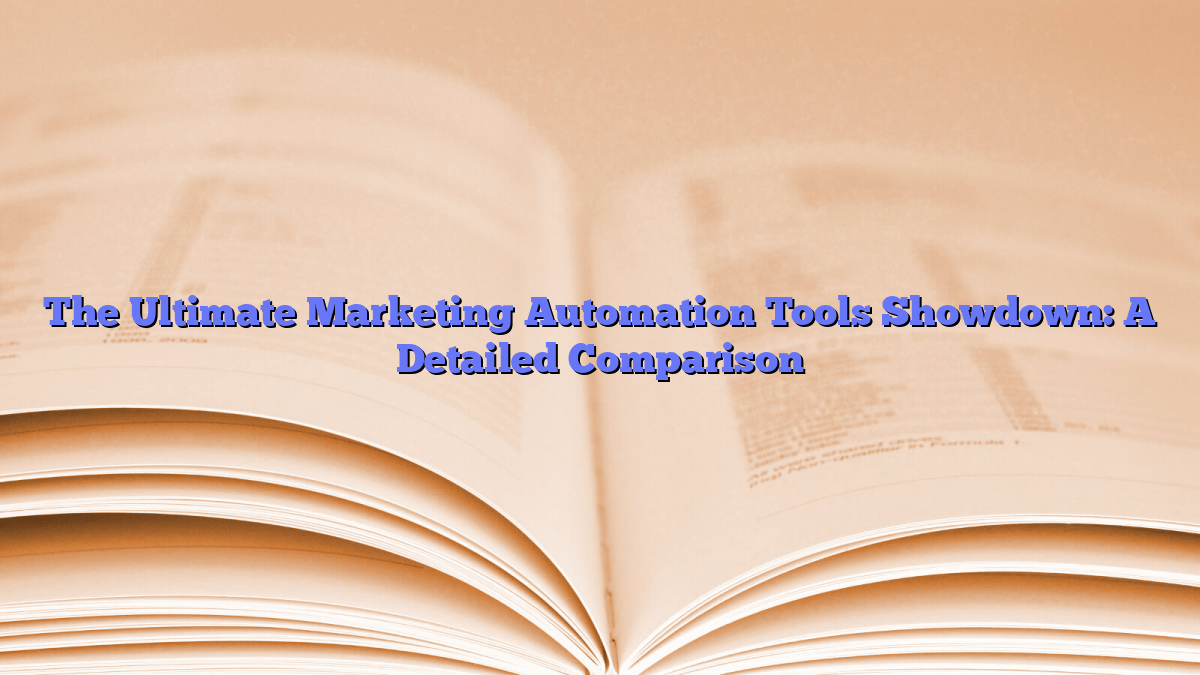Digital Marketing
The Ultimate Marketing Automation Tools Showdown: A Detailed Comparison
Marketing automation tools have become essential for businesses looking to streamline their processes, increase efficiency, and drive better results. With a plethora of options available in the market, it can be overwhelming to choose the right one for your specific needs.
Comparing the Top Marketing Automation Tools
In this detailed comparison, we will analyze some of the most popular marketing automation tools, including HubSpot, Marketo, Pardot, ActiveCampaign, and Mailchimp. We will evaluate their features, pricing, integrations, and overall suitability for different types of businesses.
HubSpot
HubSpot is a widely-used marketing automation platform known for its user-friendly interface and comprehensive features. It offers tools for email marketing, lead management, social media management, and analytics. Its pricing is based on the specific modules and features you need, making it a flexible option for businesses of all sizes.
Marketo
Marketo is a robust marketing automation solution designed for enterprise-level businesses. It offers advanced features for lead scoring, account-based marketing, and personalized content delivery. However, its pricing is on the higher end, which may not be suitable for small to medium-sized businesses.
Pardot
Pardot, a part of the Salesforce ecosystem, is a powerful marketing automation tool that focuses on B2B marketing. It offers features such as lead nurturing, lead scoring, and ROI reporting. Pardot’s integration with Salesforce CRM makes it an attractive option for businesses already using Salesforce as their CRM platform.
ActiveCampaign
ActiveCampaign is a versatile marketing automation tool that offers a range of features, including email marketing, CRM, and automation workflows. It is known for its affordable pricing and ease of use, making it a popular choice for small businesses and startups.
Mailchimp
Mailchimp started as an email marketing tool but has evolved into a comprehensive marketing platform with automation features. It offers a free plan for basic email marketing, making it an attractive option for small businesses with limited budgets. However, its advanced automation features are only available in higher-priced plans.
Conclusion
After evaluating the key features and pricing of these marketing automation tools, it is clear that each one has its strengths and limitations. HubSpot stands out for its user-friendly interface and comprehensive features, while Marketo is a powerhouse for enterprise-level businesses. Pardot is well-suited for companies using Salesforce CRM, while ActiveCampaign and Mailchimp are strong contenders for small businesses due to their affordability and ease of use.
Ultimately, the best marketing automation tool for your business will depend on your specific needs, budget, and existing technology stack. It is important to carefully evaluate each option and consider factors such as scalability, integrations, and customer support before making a decision.
FAQs
Q: What is marketing automation?
Marketing automation refers to the use of technology and software to automate repetitive marketing tasks, such as sending emails, managing social media, and tracking customer interactions. It helps businesses streamline their processes and deliver targeted, personalized marketing campaigns.
Q: What are some key features to look for in a marketing automation tool?
Some essential features to consider include email marketing automation, lead scoring, CRM integration, analytics and reporting, and workflow automation. The ability to create and manage multi-channel campaigns, such as social media and paid advertising, is also important for comprehensive marketing automation.
Q: How can I determine the right marketing automation tool for my business?
Before selecting a marketing automation tool, it is important to assess your business goals, budget, and existing technology infrastructure. Consider your specific marketing needs, such as lead generation, customer engagement, and sales enablement, and look for a tool that aligns with those requirements. It is also helpful to request demos and trials to get a hands-on experience with the platform before making a decision.
Q: What are the pricing models for marketing automation tools?
Marketing automation tools typically offer a range of pricing models, including monthly subscriptions based on the number of contacts or users, tiered pricing based on features and usage, and custom enterprise plans. Some tools may also offer a free or freemium version with limited features for businesses with smaller budgets.
[ad_2]
